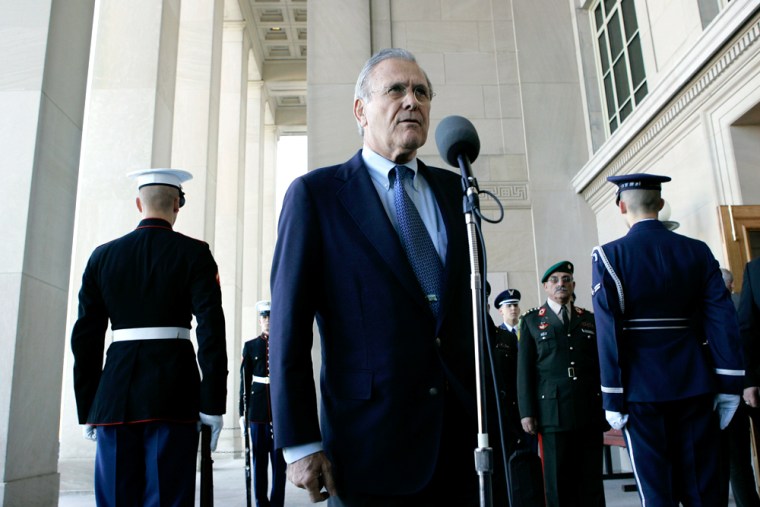WASHINGTON — U.S. Defense Secretary Donald Rumsfeld told the White House before he resigned last month the Bush administration's strategy in Iraq was not working and he proposed changes, including possible troop reductions, The New York Times reported Saturday.
"In my view it is time for a major adjustment. Clearly, what U.S. forces are currently doing in Iraq is not working well enough or fast enough," Rumsfeld said in the classified memo, dated Nov. 6. The Times posted a copy of the memo along with an article about it on its Web site.
The memo's authenticity was confirmed by NBC News and the Pentagon, which declined further comment.
Rumsfeld, as a planner and defender of President Bush's Iraq strategy since well before the U.S.-led invasion in March 2003, has been a leading public face of the war. His memo adds to the voices calling on Bush to make a significant shift in strategy as the White House, Pentagon and a congressionally created study group consider changes.
Rumsfeld outlined several options in the memo for policy changes, including reductions in U.S. forces and bases in Iraq as well as a recasting of the U.S. mission and goals there, but he endorsed no specific recommendations.
He said, however, a multiparty conference modeled after the 1995 Dayton, Ohio, talks that led to a peace agreement ending the Bosnian war was a "less-attractive" option, as was continuing on the current path.
The memo was dated a day before Democrats captured control of the Congress in midterm elections amid voter dissatisfaction over the Iraq war, and two days before Rumsfeld's resignation.
Rumsfeld remains in office pending Senate confirmation of former CIA Director Robert Gates, nominated by Bush to succeed him.
The study group, co-chaired by former Secretary of State James Baker, is expected to urge a gradual withdrawal of U.S. combat troops when it makes its report Wednesday.
There are about 140,000 U.S. troops in Iraq and more than 2,800 have been killed since the U.S.-led invasion that toppled Saddam Hussein.
Bush has indicated he will look closely at — but not necessarily heed — the study group's findings and insisted he was not looking for a "graceful exit."
"I want to hear all advice before I make any decisions about adjustments to our strategy in Iraq," Bush said in his radio address Saturday.
Bush pledged to seek bipartisan consensus on the way forward in Iraq, and offered conciliatory words but no concessions to critics of his Iraq policy.
Many in Washington hope the bipartisan Baker commission will give Bush a way to start extricating the U.S. forces from what is increasingly being viewed as a sectarian civil war.
But State Department and National Security Council officials told foreign diplomats Wednesday not to expect any major policy shifts, no matter what the group recommends, The Washington Post reported, citing unidentified diplomats familiar with the private briefing.
The group's proposals — said to include a U.S. shift away from a combat role over the next year or so, and a regional conference that could lead to talks with Iran and Syria — will carry significant weight even if Bush chooses to ignore them.
Long accused by Democrats of ignoring their advice on Iraq, Bush in his radio address acknowledged violence there was unsettling for many Americans.
"Success in Iraq will require leaders in Washington -- Republicans and Democrats alike -- to come together and find greater consensus on the best path forward. So I will work with leaders in both parties to achieve this goal," he said. Bush will hold White House talks Monday with a powerful party leader of Iraq's Shi'ite majority, Abdul Aziz al-Hakim.
